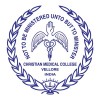15 Christian Medical College Jobs

Jr . Critical Care Therapist
Christian Medical College
posted 4d ago
Job Description
Christian Medical College is looking for Jr . Critical Care Therapist to join our dynamic team and embark on a rewarding career journey As a Therapist, your primary responsibility is to provide professional counseling and therapy services to individuals, couples, families, or groups dealing with emotional, behavioral, or mental health issues.
You will assess clients' needs, develop treatment plans, and implement therapeutic interventions to help clients improve their overall well-being and achieve their therapeutic goals.
Key Responsibilities:Assessment and Evaluation:Conduct comprehensive assessments of clients' emotional, psychological, and behavioral concerns.
Administer and interpret standardized assessment tools to gather relevant information.
Collaborate with clients to identify their strengths, challenges, and goals.
Analyze assessment results to determine appropriate therapeutic interventions.
Treatment Planning and Implementation:Develop individualized treatment plans based on clients' needs, goals, and diagnosis.
Select and implement evidence-based therapeutic interventions and techniques.
Provide counseling and therapy sessions using various modalities (eg, cognitive-behavioral therapy, psychodynamic therapy, family therapy).
Facilitate individual, couples, family, or group therapy sessions as appropriate.
Monitor clients' progress and adjust treatment plans as necessary.
Counseling and Support:Create a safe and supportive environment for clients to express their thoughts and emotions.
Assist clients in identifying and understanding the root causes of their issues.
Help clients develop coping strategies and healthy behaviors to manage their challenges.
Provide guidance and support in decision-making and problem-solving processes.
Promote self-awareness, self-esteem, and personal growth in clients.
Documentation and Record-Keeping:Maintain accurate and confidential client records, including assessment results, treatment plans, progress notes, and discharge summaries.
Ensure compliance with legal, ethical, and regulatory requirements for client confidentiality and record-keeping.
Collaboration and Referrals:Collaborate with other healthcare professionals, such as psychiatrists, psychologists, or social workers, for comprehensive client care.
Provide referrals to specialized services or community resources when appropriate.
Consult with colleagues or supervisors regarding complex cases or ethical concerns.
Continuing Education and Professional Development:Stay updated with current research, best practices, and therapeutic approaches in the field.
Attend workshops, conferences, or training programs to enhance knowledge and skills.
Engage in supervision or consultation to receive guidance and support in professional growth.
Ethical and Professional Conduct:Adhere to ethical guidelines and professional standards set by relevant counseling or therapy associations.
Maintain professional boundaries and confidentiality in all interactions with clients.
Conduct oneself with empathy, compassion, and cultural sensitivity.
You will assess clients' needs, develop treatment plans, and implement therapeutic interventions to help clients improve their overall well-being and achieve their therapeutic goals.
Key Responsibilities:Assessment and Evaluation:Conduct comprehensive assessments of clients' emotional, psychological, and behavioral concerns.
Administer and interpret standardized assessment tools to gather relevant information.
Collaborate with clients to identify their strengths, challenges, and goals.
Analyze assessment results to determine appropriate therapeutic interventions.
Treatment Planning and Implementation:Develop individualized treatment plans based on clients' needs, goals, and diagnosis.
Select and implement evidence-based therapeutic interventions and techniques.
Provide counseling and therapy sessions using various modalities (eg, cognitive-behavioral therapy, psychodynamic therapy, family therapy).
Facilitate individual, couples, family, or group therapy sessions as appropriate.
Monitor clients' progress and adjust treatment plans as necessary.
Counseling and Support:Create a safe and supportive environment for clients to express their thoughts and emotions.
Assist clients in identifying and understanding the root causes of their issues.
Help clients develop coping strategies and healthy behaviors to manage their challenges.
Provide guidance and support in decision-making and problem-solving processes.
Promote self-awareness, self-esteem, and personal growth in clients.
Documentation and Record-Keeping:Maintain accurate and confidential client records, including assessment results, treatment plans, progress notes, and discharge summaries.
Ensure compliance with legal, ethical, and regulatory requirements for client confidentiality and record-keeping.
Collaboration and Referrals:Collaborate with other healthcare professionals, such as psychiatrists, psychologists, or social workers, for comprehensive client care.
Provide referrals to specialized services or community resources when appropriate.
Consult with colleagues or supervisors regarding complex cases or ethical concerns.
Continuing Education and Professional Development:Stay updated with current research, best practices, and therapeutic approaches in the field.
Attend workshops, conferences, or training programs to enhance knowledge and skills.
Engage in supervision or consultation to receive guidance and support in professional growth.
Ethical and Professional Conduct:Adhere to ethical guidelines and professional standards set by relevant counseling or therapy associations.
Maintain professional boundaries and confidentiality in all interactions with clients.
Conduct oneself with empathy, compassion, and cultural sensitivity.
Employment Type: Full Time, Permanent
Read full job descriptionChristian Medical College Interview Questions & Tips
Prepare for Christian Medical College roles with real interview advice
What people at Christian Medical College are saying
Critical Care Therapist salary at Christian Medical College
reported by
9
employees
with 1-5
years exp.

₹2
L/yr - ₹3.6
L/yr
12%
less
than the average Critical Care Therapist Salary in India
View more details
What Christian Medical College employees are saying about work life
based on 306 employees
Strict timing
Monday to Saturday
No travel
Day Shift
Similar Jobs for you
Share an Interview































